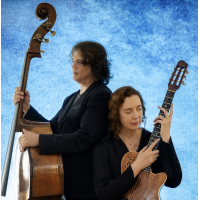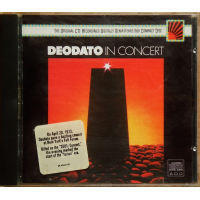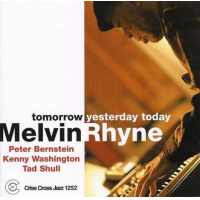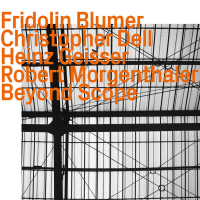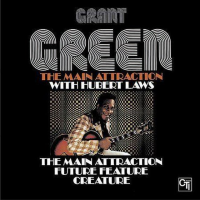Home » Jazz Articles » Liner Notes » Marc Copland: Impressions
Marc Copland: Impressions
"I've done a lot of duos," says Liebman, "and duo is the most challenging, because you really have to be concerned with very specific nuances that are particular to a wind instrument: the beginning of a note, the intonation, the vibrato, the expressive device you use...everything is exposed and you're really naked in front of the microphones. Playing duo—and especially with someone as sensitive harmonically, and as far as touch goes, as Marc—is really a great challenge and I love doing it because it raises my game."
Liebman should know, as he's shared intimate musical relationships with a number of significant pianists in addition to Copland, in particular Phil Markowitz, and Richie Beirach, with whom the saxophonist has worked, off and on, for over forty years. "All three players, who are all so great, really are completely different and bring out completely different things in me," Liebman explains. "Of the three—and pretty much of anybody I play with—Marc is the one who combines the sensitivity of the Bill Evans tradition with that Herbie Hancock thing. He's really coming from that side of things, for the most part, though he's capable of doing everything else. From a textural standpoint, especially playing saxophone with him, he's the most transparent, the most translucent, the très légère. He brings a certain response out of me as a horn player; not to be more delicate, but to know when and where to pick my spots of energy. I play pretty intense a lot of the time; that's one of my trademarks, but I love to play softly, and understated, and in this situation that's really called for."
Copland's relationship with Liebman predates his days at the piano, when he was still a working saxophonist, and he shares a similar respect. "I've played with a lot of musicians over the years, but I don't think I've ever worked with one as hardworking and dedicated as Dave; he's really into it, and it's wonderful to play with musicians with that kind of a commitment. From the beginning, even when we were both playing sax, the thing I think we shared in common, which makes the whole thing go, is an interest in understanding the outer reaches of harmony and the outer possibilities of harmony, so that when there's a certain chord symbol written on a page, it's just immediately understood that this is not a directive, this is a doorway. Dave, he totally gets that."
In a mixed program of standards and originals, nowhere is this more obvious than Impressions' opener, a take on Jimmy Giuffre's "Cry Want," from the reed and woodwind multi-instrumentalist's out-of-print Fusion session that was rescued and reissued as 1961 by ECM. Not that there's a lot to go on with this rubato sketch of a composition, but Copland attacks it with greater energy and weight than that for which he's commonly known, while Liebman's trademark expressionism lifts it to not one, but two powerful climaxes, before dissolving back into the ether from whence it came.
Herbie Hancock's "Maiden Voyage" is far better known—certainly part of the jazz zeitgeist—and, perhaps, because of its status as often-covered rite of passage for so many aspiring musicians, it runs the risk of becoming something ordinary. But with Copland and Liebman viewing its deceptively simple but open-ended structure as nothing more than a starting point, it becomes something darker, more foreboding...and entirely fresh and unpredictable.
Words like "unpredictable" are bantered about often in jazz, mainly because of its improvisational nature; but even A-list musicians fall prey to the trappings of safety and personal convention, which is what makes this set so compelling. Copland and Liebman may occupy a general space along a very broad continuum, but they're each capable of stretching their own personal boundaries to the breaking point—and those of their partners, as well. Liebman's upper register multiphonics and stretching of the melody to John Coltrane's enduring "Impressions" render it almost unrecognizable, and while he's often compared to the late saxophone icon—more, perhaps, than truly necessary—his sparer approach, even at its fieriest and most intense, is a far cry from Coltrane's relentless sheets of sound. Without a rhythm section, "Impressions" doesn't exactly swing, but it does have a pulse, one that Copland explores at length during his a capella solo, playing with atypical fire but still the kind of harmonic ambiguity that's become his own trademark, alongside the characteristic extroversion that, even in a context such as this, Liebman proves perfectly capable of turning towards a more lyrical bent.
Liebman subsequently brought "WTC"—one of two originals on Impressions' (the other is Copland's ethereally re-harmonized blues, "Blackboard")—to the set list played during a 2005 reunion of Quest, his longstanding group with Beirach, bassist Ron McClure and drummer Billy Hart, and documented on Redemption: Quest Live in Europe (HATology, 2007). Here, however, this first reading of Liebman's cathartic 12-tone piece, written in response to the events of September 11, 2001, powerfully evokes the emotions of the day, even almost a decade later. Intentional or not, then, Copland's "America the Beautiful" quote at the start of the preceding "Impressions," is, like the days leading up to that tragic day, a foreshadowing optimism shattered by the dense, low-register chords that signal the beginning of "WTC."
Following the conclusion of "WTC," the set adopts a more positive, even direct tone, with versions of Miles Davis and Bill Evans' "Blue in Green," from 1959's Kind of Blue (Columbia); a brief but buoyant solo saxophone reading of Lester Young's signature, "Lester Leaps In," that moves effortlessly between implicit swing and outrageous virtuosity; and Copland's thematically (and key signature) linked version of "When You're Smiling," where the pianist demonstrates his ability to skew even the most popular song and standard changes with the subtlest of nuanced shifts. These three songs, leading to Copland's closing "Blackboard," typify the relaxed nature with which Copland and Liebman come to the repertoire. "Most of the time," says Liebman, "when musicians of a similar generation pick their originals, everyone is usually pretty agreeable to doing what the writer wants. But once you've chosen your two or three originals, you pick tunes that are familiar—that both guys enjoy playing because of familiarity, and because we've done our 'work' by capturing, learning and negotiating the originals—me learning his language, he learning mine."
"The beauty of the standard, as any good listener knows," Liebman continues, "is that because it's a known quantity that's been done so many times, you have a certain standard that you have to come up to. Also, you have the choice to say, 'Let's look at this in a different light.' We don't really sit down and discuss the harmony, or the exact arrangement; we really leave that to be in the moment—more so than the originals. With the originals, I really want to know what Marc means. But the standard? This is jazz, and we should just be able to say 'hello,' and talk about the weather."
The two may have done little more than talk about the weather before they began playing the largely standards-focused Impressions, but from such mundane chitchat comes a performance that exemplifies the best of what each of these fine musicians does—but also, with the push-and-pull of two different musical personalities, demonstrates the ability and willingness of each to be drawn outside their normal predispositions, to create music that's the best of both, and something a little more, and a lot special.
Liner Notes copyright © 2026 John Kelman.
Impressions can be purchased here.
Contact John Kelman at All About Jazz.
With the realization that there will always be more music coming at him than he can keep up with, John wonders why anyone would think that jazz is dead or dying.
Track Listing
Cry Want; Maiden Voyage; Impressions; WTC; Blue in Green; Lester Leaps In; When You’re Smiling; Blackbeard.
Personnel
Marc Copland
pianoDave Liebman
saxophoneAdditional Instrumentation
David Liebman: soprano and tenor saxophones; Marc Copland: piano.
Album information
Title: Impressions | Year Released: 2012 | Record Label: Hat Hut Records
Tags
PREVIOUS / NEXT
Support All About Jazz
 All About Jazz has been a pillar of jazz since 1995, championing it as an art form and, more importantly, supporting the musicians who make it. Our enduring commitment has made "AAJ" one of the most culturally important websites of its kind, read by hundreds of thousands of fans, musicians and industry figures every month.
All About Jazz has been a pillar of jazz since 1995, championing it as an art form and, more importantly, supporting the musicians who make it. Our enduring commitment has made "AAJ" one of the most culturally important websites of its kind, read by hundreds of thousands of fans, musicians and industry figures every month.








